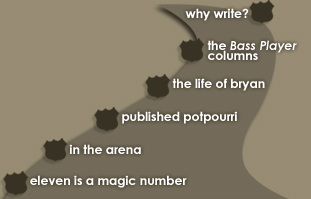
 |
|||||||||
|
|
|||||||||
| Sign up for BellerBytes, the official (and private) Bryan Beller e-newsletter. Just click here to sign up. Do it, OK? | |||||||||
|
Column
#10: For The Love Of Money There are gigs you do only for money, and then there are gigs you do only for a pile of money. Last year I played one of the latter--and it qualifies as a low point in my history as a freelance bassist. It was a “corporate gig.” Corporate gigs are like cover gigs except: (a) you get paid more; (b) you can’t wear a T-shirt that says "Liquor in the front, poker in the rear!"; (c) you can’t eat the food; (d) you do whatever The Client wants, whenever they want it. A cover gig can betray the pretense of actual music--be it an arrangement, an extended solo section, or a custom segue from “Love Rollercoaster” into “Play That Funky Music.” A corporate gig gives no such artistic quarter. There is only The Client. Not having the option to take that New Year’s Eve gig with Barbra Streisand, I took the deal on the table: one three-hour show in a posh hotel ballroom in Boca Raton, Florida, for a party thrown by a well-known purveyor of fine tobacco products. Fly in one day, play the show the next, fly out the following day. No rehearsal--here’s the song tape, learn it. Figure out the endings at soundcheck. Five Benjamins. Possibility of several future gigs with same Client. Oh, sure, why not? The tape contained one of the most schizophrenic collections ever compiled. The Village People’s “YMCA.” “We Got the Beat” by the Go-Go’s. “Dancing in the Streets.” The interminable “Play That Funky Music” (sans “Love Rollercoaster,” thank goodness). Boz Scaggs’s “Lowdown.” “Walk Like an Egyptian.” I learned them all diligently, thought about the five C-notes and an upcoming service on my ’93 Eagle Summit Wagon, and left for the airport. We arrived at the venue the following morning. The ballroom was in chaos. There would be two bands, each set up on one side of the stage. We would alternate somehow. Also present was a group of mostly female dancers and wardrobe people. The dancers had not met before and were practicing basic steps together. Badly. Both bands got the same one-hour soundcheck allotment, which meant both checked at once. Think Charles Ives. Endings received one run-through and no more, right or wrong. The dancers tried practicing their moves along with us, but we kept stopping, so eventually they gave up. Next, our bandleader (let’s call him Ted) summoned a double-band meeting. There was a crisis. The Client was very upset--someone had taken a piece of bread off a serving tray. Ted pointed to The Client’s liaison, a thin, well-dressed, well-made-up woman in her 40s. She was busy dressing down some poor lackey in a corner, her finger jabbing him in the face. Ted needed to know who the bread thief was. Right away. My throat dried up. It was me. I wasn’t aware of the No Food Rule, and I’d snatched a croissant on my way in that morning. I stepped forward. Ted’s eyes widened. I was supposed to be one of the “pros” on this job. Now, not only did Ted have to grovel on my behalf, I had to apologize to The Liaison myself. Gulping down my pride--and thinking once again of my car’s long-term health--I did the deed with grace. In return, she gave me the kind of smile an aristocrat might offer a drooling homeless person. Showtime. Ted informs me The Liaison and front-of-house soundmen will be communicating through headsets and transmitters, and that one member of each band will do the same. This person is me. (Why bassists are consistently saddled with extra-musical responsibilities is beyond me.) I am handed a bulky set of headphones and a belt-clip transmitter 60 seconds before downbeat. The belt clip is broken. It’s not wireless, and the headphone cable is a black spiral job that barely reaches the side-stage monitor board, pulling my head slightly to the left. I scream over to the monitor guy for duct tape, which he throws at me. I tape the transmitter to my leg. The first two tunes go well enough. Everybody loves the Village People--especially purveyors of fine tobacco products. I’m communicating with the soundmen via intercom and hand signals. In mid-tune, they say, “Two more and then you’re off.” I hammer-on with my left hand and give the “okay” signal with my right. Then my tape job on the transmitter fails, and it drops to ankle level, dangling by a thread and pulling my pants downward. I bend over to fix it, and the headphones sail off my head in the direction of the monitor board. I recover completely just in time for the solo in “You Can Call Me Al.” What a rush. Half-hour break backstage. Male and female dancers are frantically changing with little regard for the musicians present. There’s coffee and pastries. I’m too scared to eat anything not sanctioned in writing by The Liaison. Back onstage, halfway through “Dancing in the Streets,” I hear Miss Liaison’s voice through the headset. “Everyone off the stage. Now.” I shoot an incredulous look at the soundmen, shrugging my shoulders and making the “Huh?” face. She transmits again: “I said now!” I grab Ted (who’s singing) and tell him what’s up. He kills the song with a wave of his hand, and both musicians and dancers head for break. Forty-five seconds later, Ted tears into the backstage area. “They want to know why the hell we stopped!” I panic. “She said so herself--‘Everyone off the stage!’” “That was for the dancers only! Everyone back up and restart ‘Dancing in the Streets’ with no dancers--go, go, go!” Folding chairs, coffee cups, and half-eaten pastries all go flying in the direction of the half-naked dancers as we scramble toward the stage. My transmitter is dangling again, and the tape residue has ruined my black pants, but I can still hear the soundmen in my headphones: “Oh my God. What a clusterfuck. Who are these clowns?” Meanwhile, for the second time: Calling out around the world, are you ready for a brand new beat? * * * * * So what happened to the players in this drama? The Liaison expressed her satisfaction to Ted after the show. He hasn’t heard from her since. The dancers and musicians hit the closest watering hole and closed the place down. During the plane ride home, several of us were politely cut off from ordering any more alcohol. Me? I got my car serviced. I learned the difference between a cover gig and a corporate gig, and I discovered I could play bass while working an intercom system, adequately if not well. Best of all, I extracted a column’s worth of material from the ordeal. Maybe it wasn’t so bad after all. On second
thought, there was a cost. The next time I hear “Dancing in the
Streets,” I may hurt someone. |

|